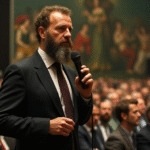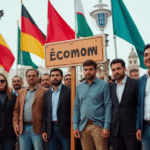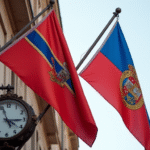Introduction
In a world that’s becoming increasingly interconnected and technologically advanced, it’s easy to feel overwhelmed by change. This sentiment resonates with the Spanish philosopher Joseph Ratzinger, who once expressed concern that in an era dominated by mathematical thought, humanity might be threatened by a lack of ideas and the reluctance to think.
Historical Parallels: The 16th Century and Today
Reflecting on a course about 16th-century Spanish history, I recall how Jesuit scholar Martín María Morales emphasized the pervasive melancholy in Hispano-American society rather than historical events. He illustrated this through various art pieces, musical compositions, and literary works.
During the 16th century, Spain’s imperial ambitions and technological advancements like caravels, improved compasses, and the spread of printing presses made the world larger and more accessible. Simultaneously, people felt increasingly distant from one another due to the expulsion of Muslims and Jews, along with religious dogmatism nearing a critical juncture. Amidst this uncertainty, authority had to assert itself, sometimes through force, to maintain control.
Drawing parallels between the 16th century and today, I’ve long believed that our current era mirrors that time. With globalization, technological progress, mass migrations, and the end of one era giving way to another, there’s a palpable sense of unease among many.
Carlos Bravo Regidor’s “Mar de Dudas”
These thoughts bring me back to Carlos Bravo Regidor’s project of interviews, which culminated in the book “Mar de Dudas: Conversaciones para navegar el desconcierto” published by Grano de Sal in collaboration with Gatopardo.
Bravo Regidor, a political scientist with journalistic credentials, interviewed numerous influential authors on pertinent topics such as the erosion of democracy, the rise of populism, truth and common sense, inequality, and the impact of contemporary armed conflicts.
The Unique Genre of “Mar de Dudas”
What sets this book apart is its genre. Instead of compiling essays from various published works by the authors, Bravo Regidor carefully selected audio interviews that offer an immersive reading experience. The meticulous editing by Sandra Barba and Tomás Granados allows readers to almost hear David Altman’s Uruguayan accent as he explains the advantages and limitations of direct democracy.
The interviews’ appeal extends beyond the novelty of listening to spoken words. Unlike written communication, which involves fixed contours and contents, spoken language is fleeting. It either reaches the listener or doesn’t.
Engaging with Authors through Interviews
These interviews are captivating not only for the auditory experience but also for the glimpses they offer into the minds of the interviewees. For instance, in an interview discussing a nation’s loss to authoritarianism and potential recovery, Turkish writer Ece Temelkuran shares a near-death experience that led her to believe that “our true strength lies in our commitment to beauty.”
A well-conducted interview can also expose the gaps in an interlocutor’s convictions, not to criticize or judge but to demonstrate that even the most informed individuals piece together their understanding of the world bit by bit. One such example arises from a minor disagreement between Bravo Regidor and Rebecca Solnit regarding the Zapatista movement, where Solnit acknowledges that the slogan “everything for all, nothing for us” may have been realized in both tragic and magical ways.
Themes and Recommendations
“Mar de Dudas” tackles public matters, democracy, coexistence, social consensus possibilities, and the role of thought in addressing today’s big questions. The conversations aim to help readers navigate uncertainty, as the title suggests.
While the book excels in its project, I believe it could have benefited from interviews with climate change and artificial intelligence experts to engage a broader audience. Nonetheless, the interviewees represent a spectrum of ideologies, from liberal to progressive, with Francis Fukuyama’s conservative trajectory standing out.
Personally, I would have appreciated an interview with a compelling and intelligent conservative thinker like American psychologist Jonathan Haidt. His absence is a missed opportunity to apply his words about embracing ambiguity in analysis to the author’s journey through this sea of doubts.






